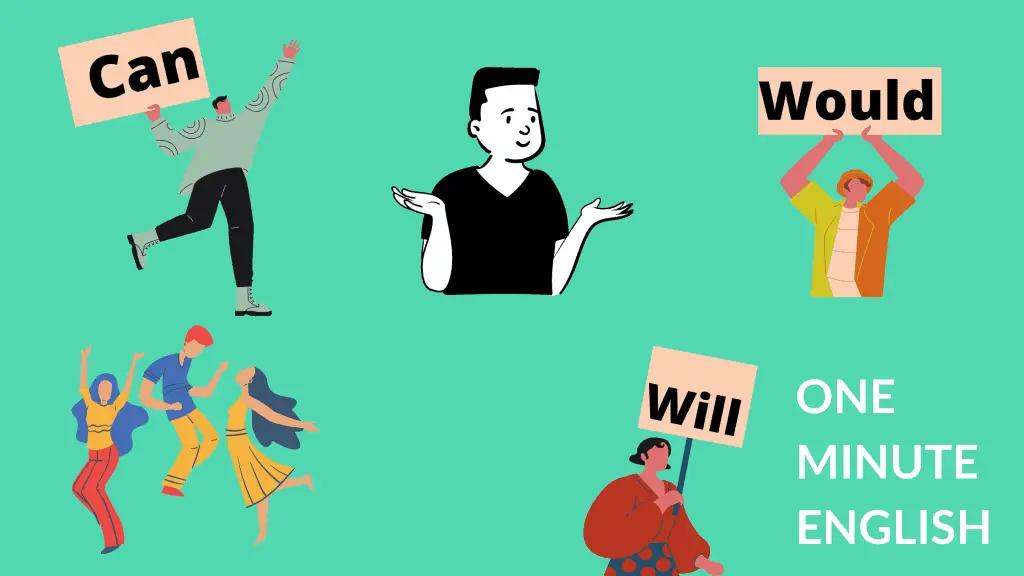Exemplos de verbos modais e significado
Os verbos modais adiciona mais significado ao verbo principal.
I might go to the cinema later. (adiciona possibilidade)
Não há necessidade de conjugar a terceira pessoa de um verbo modal.
He might go to the cinema later. (not mights)
Verbos modais mais comuns
Will
Utilizamos will nas seguintes situações:
Promessa
I will do the washing later.
I will marry you.
Decisão instantânea
I will help you.
I will buy some milk.
Certa previsão
We will use robots more in the future.
Liverpool will be champions this year.
Como você pode ver, will é normalmente usado para situações futuras.
Would
Situação imaginada
I would go to Bali if I had the money.
I would have felt better if I hadn’t eaten all that chocolate.
Eventos regulares no passado(used to)
I would play football for hours when I was a child.
I would go to the seaside every summer.
Futuro do discurso reportado
Jane said she would meet her mother.
He said he would write the report.
Should
Uma boa idéia/conselho
You should go to the doctor.
You should see that movie.
Quando algo não está certo
They should be here by now.
The screw should be here somewhere.
Previsão incerta
I have done everything so it should work.
The train should arrive in 5 hours.
Must
Necessidade/Obrigação
You must practice speaking English.
You must clean your house.
Dedução/entendimento lógico/especulação
You have been walking all day. You must be tired.
It is very hot in here. You must be thirsty.
Have to
Obrigação/necessidade
I have to wear glasses to read the newspaper.
I have to go to work every day.
May
Possibilidade
I may go to church this Sunday.
I may be late this evening.
Pedir permissão(educado)
May I use the bathroom?
May I have some milk?
Might
Possibilidade
I might go to church this Sunday.
I might be late this evening.
Can
Possibilidade/Permitida
We can eat ice cream after dinner.
We can have a dog next year.
Habilidade
I can speak four languages.
I can play the guitar.
Permissão
Can I use the bathroom?
Can I go visit Thailand now?
Ofertas
Can I help you with your homework?
Can I do anything to help you?
Could
Possibilidade/Sugestão
We could go for a walk after dinner.
We could spend that money on a new dishwasher.
Habilidade no passado
I could play the piano when I was a child.
You could buy a lot with 1 pound when I was a child.
Solicitação
Could you pass me the water?
Could I use your phone, please?
Verbos modais negativos
Alguns verbos modais negativos não têm um significado diretamente oposto.
Mustn’t
Oposto do Must. É necessário que você não faça isso.
You mustn’t walk on the grass.
You mustn’t smoke in here.
Don’t have to
Não é necessário, mas você pode, se quiser.
You don’t have to do your homework. (mas você pode se quiser)
You don’t have to study grammar.(mas ajuda se você fizer)
Verbos modais menos comuns
Had better
Boa Idéia/Advisível
I‘d better go home before it starts raining.
I had better not buy that coat.
Shall
Oferta
Shall I help you with your coat?
Shall I make you a cup of tea?
Sugestão
Shall we go?
Ought to
Conselho
You ought to know better!
Dedução
$50 dollars ought to be enough.
Needn’t
Não necessário
You needn’t do your homework.
- Como Verificar se os Alunos estão usando o ChatGpt(+outros escritores A.I.) - janeiro 13, 2023
- Meus Escritores de I.A Favoritos para 2023 (Geradores de Texto I.A) - janeiro 2, 2023
- Qual é o custo de estudar na Wizard?(Preço do Wizard 2022) - maio 10, 2021


